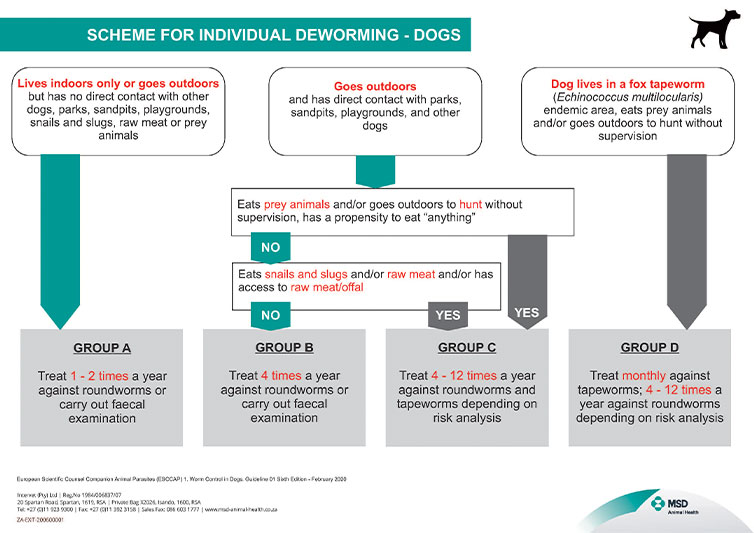Deworming Dogs for Better Health
Deworming your dog should be an essential part of their health routine. Read on learn more about the causes, treatment and prevention of worms in dogs.
DOG HEALTH

Posted by bravectosouthafrica – 14 September 2020
When to Treat Your Dog
One dog’s needs are different to the next. When determining how often to deworm your dog, there are multiple factors that should be taken into account, including how much of the day the dog spends outdoors and/or with other animals, what they eat and the region they inhabit. A dog that has minimal contact with risk factors like other (prey) animals, parks, sandpits and raw meat won’t have to be dewormed as often as a dog that frequently roams the outdoors unsupervised, for example.
Most parasitic worms like hookworms, roundworms and tapeworms live in the dog’s intestines, so it’s not easy to self-diagnose. An exception is that tapeworm segments can be seen in the afflicted dog’s faeces and around their rear end. The segments resemble grains of rice.
A severe case of untreated internal parasites can lead to death, so it is important to keep an eye on your dog for any of the following signs:
- Bloody faeces
- Diarrhoea
- Vomiting
- Anaemia
- Appetite loss
- Weight loss
- Seizures
- Vision loss
- Swollen belly
- Coughing
If you suspect that your dog has worms, bring your vet a stool sample to your dog’s next check-up. Should this not be possible, your vet will get one during the appointment. Underneath a microscope, the vet will check the sample for signs of worms and determine which kind, if present.
Treatment Options
Your vet will be able to determine which dewormer and dose is right for your dog. Treatment can take the form of an oral medication, top-spot application or an injection. Many medications are broad-spectrum, ensuring your dog is treated against a host of internal parasites.
Most vets will recommend starting deworming puppies at 2-3 weeks old. The complete deworming of a pet will usually require more than a single dose (depending on the drug being used). The first dose you or your vet gives your pup kills any worms currently living in the organs. Subsequent doses are given to treat any immature, migrating worms that re-enter the gastrointestinal tract to complete their life cycle. You will treat an adult dog in a similar way.
Diagnosing and treating heartworm is a bit more complicated (read Fetch by WebM’s article). Although this is a rare occurrence in most of South Africa, it has been diagnosed before and your veterinarian will be able to guide you, should it happen.

Deworming for Dogs – A Flow Diagram
Be sure to study the ESCCAP guideline, presented in the table below. It provides you with an estimate of how often you need to deworm your dog. However, it is always advisable to discuss issues regarding your dog’s health with your vet before administering medications/starting treatments.

The Causes of Worms in Your Pet
Dogs’ risk of contracting internal parasites increase if they:
- Accidentally ingest infected fleas (which transmits tapeworm)
- Drink contaminated water/lick the ground
- Eat raw offal (which may contain tapeworm cysts)
- Hunt/scavenge
Puppies can also become infected before birth, via the mother’s placenta, as well as through nursing from the mother.

Preventing Intestinal Worms and External Parasites
Prevention is the best way to keep your pet safe from internal (and external) parasites. For your pet to remain worm-free, it is advised to follow these measures:
- Daily clean-up of all pet faeces in your yard to avoid the development of infective larval stages in the environment
- Invest in an external parasite treatment, such as Bravecto® for Dogs – remember, accidentally ingesting fleas can lead to a tapeworm infestation
- Don’t feed raw offal to your dogs – ensure all meats are well-cooked (this practice also disrupts the dietary balance of any commercial pet food diets provided)
- Have your vet check your dog for worms annually (at least) and 2-4 times a year for puppies (up to a year of age)
- Wash your hands after petting an animal or cleaning up their waste – some worms can be transferred to humans (zoonoses)
- Deworm all your pets and family regularly (See guiding table above)
To the devoted pet parent, it is clear that your dog’s outside also needs protecting against parasites. By giving your dog a Bravecto® Chew, you keep them protected against fleas and ticks for up to 12 weeks. Alternatively, Bravecto® Spot-On for Dogs will see your pooch remain tick-free for 4 months and flea-free for 6 months, once the environmental stages have been eliminated.
There are many tick, flea and mite treatments on the market, but none of the traditional spot-on or chew treatments lasts as long as Bravecto®. Invest in one of the best treatments that works if you care about your dog’s wellbeing.

Subscribe to our Newsletter
Get to know your furry friend better! Sign up for all things dog- or cat-related.
The Hairy Facts about the dreaded hairball
12 April 2021
Help! My dog’s barking mad! Volume 2
12 April 2021
Your Itchy, Scratchy Cat – All About Cat Skin Problems
12 April 2021
The Dog’s Diet: A Bone of contention?
01 April 2021
Mango Fly Worms: How to Spot and Eliminate them
Posted on November 28,2019
Managing Mange And Mites In Your Dog
Posted on June 11,2018
Why Do Cats Purr and How? Learn What Your Cat Is Saying
Posted on October 14,2020
How to Get Rid of Ear Mites in Dogs
Posted on November 06,2019









